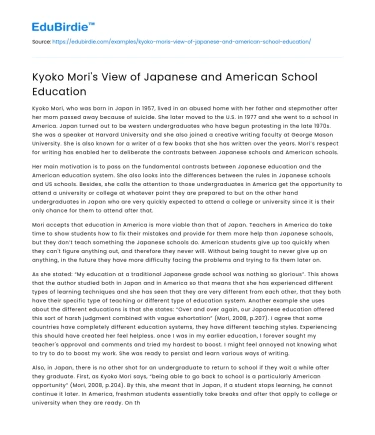Kyoko Mori, who was born in Japan in 1957, lived in an abused home with her father and stepmother after her mom passed away because of suicide. She later moved to the U.S. in 1977 and she went to a school in America. Japan turned out to be western undergraduates who have begun protesting in the late 1970s. She was a speaker at Harvard University and she also joined a creative writing faculty at George Mason University. She is also known for a writer of a few books that she has written over the years. Mori’s respect for writing has enabled her to deliberate the contrasts between Japanese schools and American schools.
Her main motivation is to pass on the fundamental contrasts between Japanese education and the American education system. She also looks into the differences between the rules in Japanese schools and US schools. Besides, she calls the attention to those undergraduates in America get the opportunity to attend a university or college at whatever point they are prepared to but on the other hand undergraduates in Japan who are very quickly expected to attend a college or university since it is their only chance for them to attend after that.
Save your time!
We can take care of your essay
- Proper editing and formatting
- Free revision, title page, and bibliography
- Flexible prices and money-back guarantee
Mori accepts that education in America is more viable than that of Japan. Teachers in America do take time to show students how to fix their mistakes and provide for them more help than Japanese schools, but they don’t teach something the Japanese schools do. American students give up too quickly when they can't figure anything out, and therefore they never will. Without being taught to never give up on anything, in the future they have more difficulty facing the problems and trying to fix them later on.
As she stated: “My education at a traditional Japanese grade school was nothing so glorious”. This shows that the author studied both in Japan and in America so that means that she has experienced different types of learning techniques and she has seen that they are very different from each other, that they both have their specific type of teaching or different type of education system. Another example she uses about the different educations is that she states: “Over and over again, our Japanese education offered this sort of harsh judgment combined with vague exhortation” (Mori, 2008, p.207). I agree that some countries have completely different education systems, they have different teaching styles. Experiencing this should have created her feel helpless. once I was in my earlier education, I forever sought my teacher's approval and comments and tried my hardest to boost. I might feel annoyed not knowing what to try to do to boost my work. She was ready to persist and learn various ways of writing.
Also, in Japan, there is no other shot for an undergraduate to return to school if they wait a while after they graduate. First, as Kyoko Mori says, “being able to go back to school is a particularly American opportunity” (Mori, 2008, p.204). By this, she meant that in Japan, if a student stops learning, he cannot continue it later. In America, freshman students essentially take breaks and after that apply to college or university when they are ready. On the other hand, Mori says that in Japan students are just given one opportunity to get a degree in school and the best way to get into school is to take ‘level tests’ directly after they are done from high school.
In conclusion, students are not helped in schools in Japan like they are in America. In Japan, students don’t have second opportunities to return to school as they do in America. It is terribly true that you just will barely get a second probability in Japan and if you fail the primary time individuals would see you as a failure that makes many folks discouraged to truly strive tougher and at the tip several would quit and take a look at and notice a coffee paying job that the majority of time they don’t enjoy doing. Because of this, it is easy to agree with Kyoko Mori. I have to agree that the yank manner of teaching is healthier. In America, students are given feedback from lecturers on ways to enhance their writing. In Japan, it's not similar which looks extremely unfair for the Japanese students UN agency are expected to try and do higher without learning, however.






 Stuck on your essay?
Stuck on your essay?

